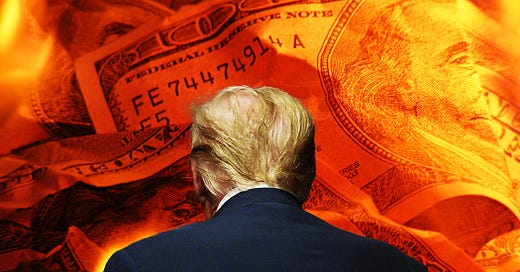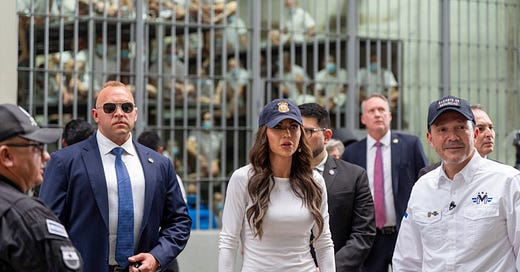
Here’s How Trump Will Try to Defend Himself in the Hush-Money Case
Plus: Why tabloid kingpin David Pecker’s testimony matters.
GOING INTO THE FOURTH DAY of Donald J. Trump’s trial on 34 counts of falsifying business records in the first degree, there’s a lot we’ve already learned. David Pecker, former publisher of the National Enquirer and former CEO of its parent company, testified that in August 2015 he met with Trump and fixer Michael Cohen at Trump Tower where he says he was asked “what I can do and what my magazines could do to help [Trump’s 2016] campaign.” Pecker says he agreed to be the “eyes and ears” of the campaign. This opening testimony was critical to the government’s case for two reasons.
First, it introduced to the jury Trump’s knowledge of and complicity in the “catch-and-kill” scheme that allegedly produced the $130,000 payment to adult film start Stormy Daniels in the lead-up to the 2016 election in order to keep her quiet about a claim that she had sex with Trump. This is important because the Manhattan district attorney’s office must prove for each count that Trump had an intent to defraud—that is, the requisite mens rea (Latin for “guilty mind”), which is often a key dividing line between conduct that is criminal and could deprive someone of liberty if convicted, and conduct that is not.
Second, Pecker’s testimony put before the jury that the reason for the $130,000 payment was Trump’s presidential campaign. It wasn’t concern over personal embarrassment or the future of Trump’s television career or the possibility of upsetting his wife, Melania Trump. This is important because the government’s theory of the case is essentially that Trump committed a crime within a crime—that he falsified business records with an intent to commit another crime, or with an intent to aid or conceal the commission of another crime. For the D.A., the inclusion of the secondary crime is what elevates misdemeanor offenses for falsifying business records to felonies.
The original indictment didn’t specify what the second crime is, but the government’s later filings set out four theories:
first, that Trump violated the Federal Election Campaign Act’s limits on corporate and individual contributions to a campaign by making the Daniels payoff;
second, that Trump violated the laws of New York governing elections—specifically § 17-152, which bans conspiracies to influence elections by “unlawful means”;
third, that Trump violated New York’s tax law because the payments made to Cohen were “grossed up” to compensate Cohen for the taxes he incurred by receiving repayment for the hush money he gave to Daniels; and
fourth, that Trump’s actions caused the National Enquirer’s parent company and Cohen to make false entries in business records.
Among Trump’s many legal motions earlier this year was an attempt to dismiss the indictment on the rationale that none of these theories legally hold up, for various reasons. The court partly agreed with him—but only on the fourth one. The other three are what the trial is all about. The government must now prove that Trump falsified business records—by disguising the payouts as legal fees to Cohen—in order to conceal that he was really making campaign contributions, or at least to dupe New York tax authorities into thinking that it was income to Cohen rather than a payment to Daniels (and others, including Playboy model Karen McDougal and a doorman who also had stories that the Trump campaign wanted killed).
TRUMP HAS THREE PRIMARY DEFENSES going for him.
The first is that he can claim that he didn’t have the requisite mens rea because he relied on Cohen and others within his organization to take care of the nitty-gritty. He just signed where he was told and left lawyers, accountants, and bookkeepers to deal with the financial side. Given how high-level and important he is, the argument goes, he cannot be expected to have tracked everything, so he cannot possibly have had the requisite intent to falsify business records to the first degree.
The second possible defense Trump could put forward would be that the reason for the payoffs had nothing to do with the campaign. What he really meant to do was protect his professional and personal reputation, and protect his wife, who, at the time of his assignation with Daniels, had recently given birth to their son, Barron Trump. As a result, Trump could not have intended to commit or conceal violations of federal and state election laws. The worst he did was cook the books to protect his private life.
The problem with these first two defenses is that a jury will likely see through them. The evidence establishing the August 2015 meeting—not to mention Trump’s own reputation for sleaziness and self-dealing—will probably persuade the jury that Trump acted as he did because he knew the hush money payments were not entirely legal, but believed that keeping Daniels and the others quiet was that important to his presidential campaign. After all, the payment was made shortly after the revelation of the infamous Access Hollywood tape in which he was caught on a hot mic bragging about assaulting women at beauty pageants, and his campaign was in jeopardy.
Which brings us to the third potential defense for Trump, which is stronger than the others.
Trump’s lawyer, Todd Blanche, argued in his opening statement that the secrecy of the payment—and the fact that Daniels was asked to sign a nondisclosure agreement (NDA)—amounted to “nothing illegal.” That’s accurate; NDAs are not illegal, even if they’re meant to keep people silent. Blanche went on to add that trying to influence an election isn’t illegal, either: “It’s called democracy.” That statement is weighty. Blanche’s argument is that, even if everything the D.A. says Trump did is true, it’s not really a crime—or at least it shouldn’t be treated as one by the jury in this case. On cross-examination, the defense team will hammer Cohen’s record of perjuring himself and try to paint Daniels as an opportunist who seized a chance to make money on Trump’s political fame. Taken together, these shady dealings are just how the game is played and should not land Trump in jail.
Helping the defense is the scant history of the Federal Election Commission’s prosecution of hush money payments as illegal campaign contributions. Individuals are capped in the amounts they may contribute to any given candidate’s campaign, and federal law defines a contribution to a candidate to include “expenditures made by any person in cooperation, consultation, or concert, with, or at the request or suggestion of, [that] candidate.” But it says nothing about payments to keep women silent about their affairs with a candidate.
It’s true that, in 2018, Michael Cohen pleaded guilty to violating these limits on the same facts, for which he served over thirteen months in prison. But that plea amounts to one defendant’s agreement to cave to the government’s theory rather than test it at trial. And although the Federal Election Commission found that Pecker violated the campaign limits, that’s a government agency—not Congress (which enacted the law) or a court (with the authority to definitively interpret it).
In 2011, former Democratic presidential candidate John Edwards was indicted under similar circumstances, with mixed results. Two wealthy individuals had given large sums of money in 2007 and 2008 to silence his mistress with whom he had a child. Prosecutors alleged that the payments were effectively contributions to his 2008 campaign because they would not have occurred absent the campaign and they freed up funds for the campaign to use on other endeavors. Edwards argued that he was worried about the effect the revelation would have on his wife, who was sick with cancer. The jury found Edwards not guilty on one charge but was unable to come to a verdict on the rest. DOJ elected not to retry the case after the mistrial, so that case isn’t solid precedent for the government’s theory.
When Manhattan District Attorney Alvin Bragg first announced the charges against Trump in April of last year, a number of legal and political pundits denounced the indictment as overreaching because of the ambiguities around the election law issue and also because, at the end of the day, a former president was indicted over bad business records. One year later, with the trial now underway, and with under 200 days to go before an election that could shift American democracy into an authoritarian nightmare, Bragg’s case against Trump feels like it could go either way. And in that sense, it acutely reflects the precariousness of the moment.

















